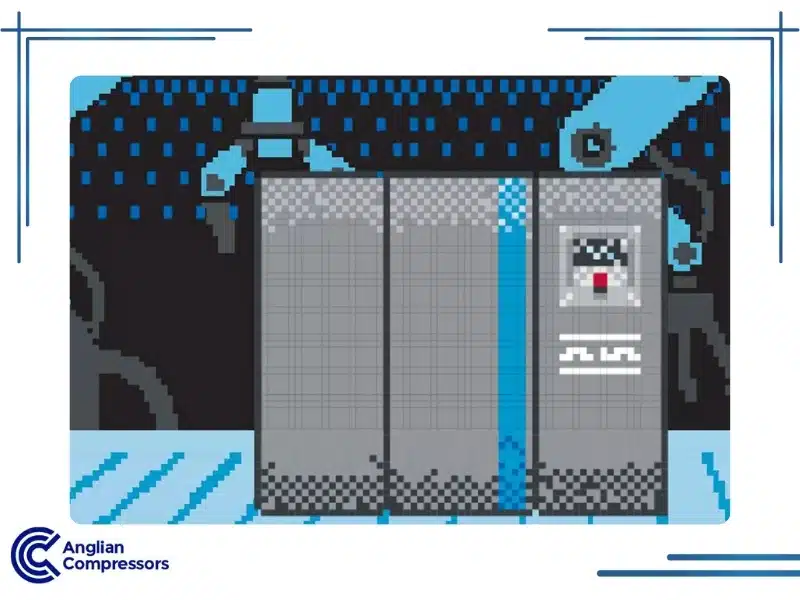Digital Transformation in the Air Compressor Industry
The embrace of new technologies has become fundamental to making progress. Digital transformation in the air compressor industry is underway, with companies reshaping how air production looks by using data to improve operations.
The updated approach leads to noticeable cost reductions, operational sustainability, and improved equipment longevity. Companies can attain a competitive edge by embracing automation, machine learning advances, AI integrations, and new predictive maintenance methodologies.
Anglian Compressors, experts in the industry, offer this primer on the meaning of technological transformations in the air compressor industry.
The Evolution of Air Compressor Technology
Compressed air systems have been used for decades. Legacy systems require a hands-on approach and manual monitoring. Maintenance was not ignored; it was scheduled.
Later, the air compressor industry began using sophisticated digital technologies. Successful digital systems involved transitioning from standalone compressors to multiple networked compressor units. This increasingly digital approach eventually became more familiar through the commonly used term Internet of Things (IoT).
Companies have begun employing a digital ecosystem that includes automation and smart sensors. The sensors send real-time data to a central system. Today’s fast-paced industry relies on these technological advancements to enhance performance.
Key Drivers of Digital Transformation in the Air Compressor Industry
The primary drivers for a better digital future in the air compressor industry are shown below.
Energy Optimisation – reduced energy consumption from an average of 10% to several points lower. This is achieved in various ways, including improved energy efficiency, cross-functional systems, and optimisation.
Predictive Maintenance – instead of maintenance based on a calendar, AI plays an important role. It sends alerts when parts need replacing, filters are clogged, or air output declines, reducing unexpected downtime.
IoT-Linked Systems – real-time data flows embrace big data. Remote monitoring increases efficiency by constantly monitoring air system performance. Automated adjustments, based on set parameters, boost performance.
Remote Work and Automation: companies increasingly permit remote work to manage current events and stay ahead. Combining remote working with automation releases a team’s full potential, letting staff put their best efforts into the most productive work.
Regulatory Compliance – rapidly changing technologies help companies to meet increasingly stringent regulations.
Need an updated approach to your air system? Get in touch with our experts at Anglian Compressors.
Digital Technologies Revolutionising Air Compressors
Air compressor systems must remain competitive in today’s digital world. Below are a few ways this is achieved.
Internet of Things (IoT)
Atlas Copco compressors now come with a collection of sophisticated sensors. These deliver real-time data analytics, providing feedback on temperature, air pressure, and efficiency.
Continual manual oversight is no longer required. Instead, IoT systems allow managers to view smart diagnostic readouts remotely and make adjustments on the fly, as needed.
Artificial Intelligence (AI) and Machine Learning (ML)
AI casts an eye to a promising digital future by alerting staff when components are underperforming, failing, or needing immediate replacement. Maintenance schedules are adjusted accordingly.
ML digs into historical air system data and real-time data inflows to deliver smarter reports to managers.
Augmented Reality (AR)
AR allows managers to offer feedback to technicians during maintenance procedures.
Repair approaches are modelled first to validate which ones are likeliest to succeed. This helps resolve problems sooner and removes potential human error.
Cloud-Based Analytics
Compressor data is stored in a cloud platform. This leads to better analytics, leveraging what is learnt industry wide.
Gain access to meaningful insights and new compressor operational recommendations from a broader set of users.

Benefits of Embracing Digital Transformation
There are multiple benefits to updating business processes to embrace digital transformation. Below are a few of them.
Operational Efficiency
Digital control systems allow operators to optimise system performance. Automation reduces waste by adjusting operations based on real-time sensor data.
Cost Savings
Emergency repairs are largely avoided by using predictive maintenance. Ad hoc repairs, when indicated as necessary, are scheduled appropriately to reduce unplanned system downtime.
Smart algorithms improve system efficiency. Energy consumption is optimised to produce the necessary air output at the lowest cost.
Increased Equipment Lifespan
Continuous monitoring of air systems avoids equipment damage because of ineffective post-incident maintenance. Equipment lifespan is protected – and sometimes extended – by reduced wear and tear.
Sustainability
Green initiatives, including lowering carbon footprints and using data-based air systems, are supported.
Need to improve the green credentials of your air system? Talk with our experts at Anglian Compressors.
Challenges in Implementing Digital Solutions
Do companies encounter difficulties implementing digital solutions? Change management rarely involves travelling on a straight path.
Here are some of the potential hurdles to consider.
Integration with Legacy Systems: older compressors do not always have connectivity features or sensors that supply components or performance feedback.
Data Security Concerns: using IoT-enabled air compressors requires smart data management to protect against cybersecurity threats.
Workforce Adaptation: IoT-based tools and AI/automation systems require employees to accept continuous learning.
Initial Investment Costs: upfront costs are considerable. Recouping the investment is expected; however, it requires a long-term perspective on cost savings.
Case Studies
IoT and AI are major factors in the advancements made by smart compressor manufacturers and air system users.
Atlas Copco’s Smart Air Initiative
Atlas Copco’s Smart Air initiative focused on obtaining the highest reliability, improving efficiency, and minimising compressor servicing time.
This was obtained through IoT implementations with compressors, allowing energy usage monitoring and automation and boosting performance.
Linking compressors, air dryers, controllers, boosters, generators, and other equipment allows high optimisation levels. This reduces energy consumption, while preventive maintenance based on data received lowers system downtime.
Metron Energy’s Digital Air Optimisation
The digital air optimisation strategy from Metron Energy improved efficiency levels.
AI-driven analytical data suggested air production sequencing adjustments to lower energy requirements for the same air output. Furthermore, setting individual KPIs for each plant provided additional optimisation benefits.
Their strategies allowed various industries to lower carbon emissions while reducing energy expenditures.
Manufacturers Implementing Cloud-Based Predictive Maintenance
Real-time performance monitoring allowed manufacturers to lower compressor failures by half.
These results demonstrated the benefits of predictive maintenance over using a fixed maintenance schedule.
Future Trends in Digital Transformation for Air Compressors
Here are some future air compressor trends to be aware of.
AI-Powered Self-Optimising Compressors – autonomous air pressure and output flow adjustments based on an optimal efficiency model.
Greater IoT Integration – more interconnected devices permit industrial facilities to run automatically. Operational oversight and integrated control systems allow operational confidence.
Blockchain for Data Security – compressor maintenance records are logged securely and stored in the blockchain.
Advanced AR Applications – field technicians will increasingly be provided remote assistance troubleshooting, supporting more predictable repair timeframes.
Sustainability-Focused Digital Solutions – eco-friendly air compressors will continue incorporating AI-driven controls based on improved operational efficiency, further reducing energy costs.
Conclusion
The digital transformation inside the air compressor industry is evolving and ongoing. It stresses better efficiency rates, sustainable results, a greener industry, and lower energy costs.
Investment in smart technologies offers a competitive edge and delivers long-term savings for companies with sufficient foresight. The adoption of IoT, AI, ML, and AR is only at its earliest stages within industrial air compression.
Get in touch with Anglian Compressors to leverage digitisation for your business.


